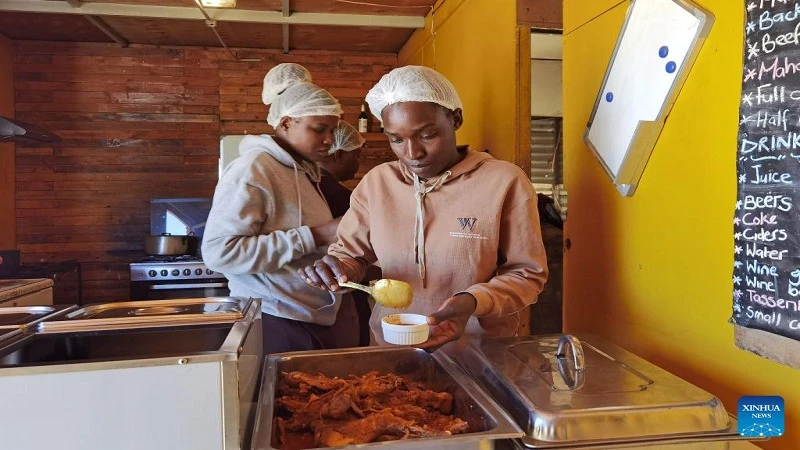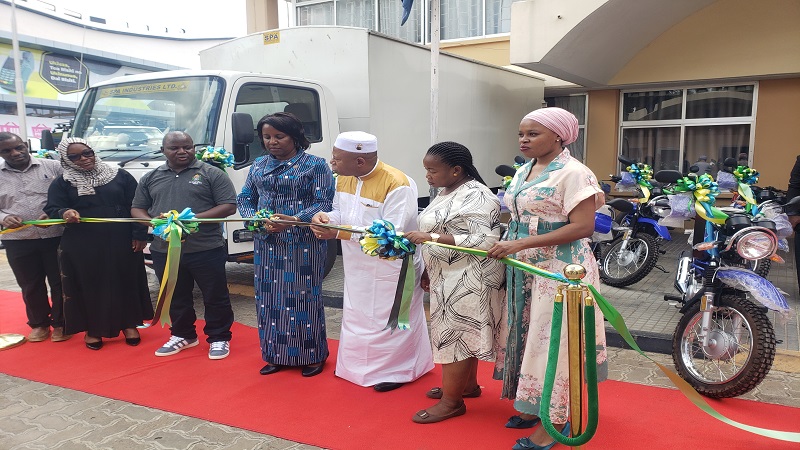Woman entrepreneur finds niche by leveraging traditional cuisine in Namibia

IN an informal settlement about 10 km from the city center of Windhoek, the Namibian capital, a local woman entrepreneur is leveraging traditional food to transform the business scene in the area and has achieved success via catering business.
Saima Mukwiilongo, the owner of Sai's Kitchen, said she established the eatery in 2017 in the informal settlement popularly known as Havana, to redefine the often overlooked local cuisine and create employment, which is a challenge in Namibia.
According to the Namibia Statistics Agency, the country's unemployment rate stands at 33.4 percent.
The food outlet, which is named after the first three letters of the founder's name, offers traditional meals using indigenous ingredients. The menu includes dishes made with spinach, peas, tripe, marula oil, chicken, mahangu (pearl millet), maize porridge, and various types of meat. It provides a range of services, including sit-down dining, takeout, delivery, and event catering.
"It is also about taking people back to their cultural roots and making traditional food easily accessible in an urban setting," she said in a recent interview.
Mukwiilongo developed her culinary skills while working at a restaurant in Windhoek during her second year of studies at the International University of Management, where she was pursuing a degree in HIV/AIDS management.
"While I wanted to earn money to offset costs, it sparked my interest in food, something I was not really good at. Growing up here, I played more with my boy siblings as I am the only girl child," she said.
According to the 30-year-old mother, her other goal was to redefine business models in informal settlements, which are dominated by informal and unregistered businesses.
"While the outlet architecture is still corrugated iron to create an essence of belonging, the business model is formal and friendly, which is our niche," she said.
Over the years, Mukwiilongo has managed to attract new clientele by highlighting the value of tradition through aggressive social media marketing.
According to her, many people are surprised to find a food enterprise like hers in an informal settlement. Eight years on, the establishment has served nearly 10,000 clients who seek to immerse themselves in traditional food. Sai's Kitchen has also become a hub for socialization.
"Therefore, we have not only attracted people to dine but also to visit Havana's informal settlement for the first time, promoting diversity and exposure," she said.
To sustain the business, proceeds are reinvested along with continued robust marketing strategies. From initially starting as a one-person operation, the outlet now employs ten staff members.
Meanwhile, Sai's Kitchen has made a significant impact on the local community since its opening.
The catering enterprise also sources ingredients from local vendors and entrepreneurs, positively aiding the local economy. "I grew up here in Havana, and I'm a firm believer in starting where you are, which, in my case, is at home," Mukwiilongo said.
For Windhoek-based vendors like Selma David, this creates a value chain that aids the growth of informal trade at the grassroots.
In addition, locals have resonated with the eatery's meals and broader contribution to shifting business norms in informal settlements.
Apollo Shigwedha, 34, who works at a government agency, has lived in Windhoek for over 11 years. He said he learned about Sai's Kitchen from social media, where he got the chance to immerse himself more by socializing in informal settlements. The visits broadened his perspective and helped him embrace multiculturalism through the cuisine offered at the catering outlet.
The outlet is also a popular spot for those seeking natural options and the health benefits of traditional foods. "We have also received tourists keen for a true township experience," Mukwiilongo said.
As part of its business growth strategy, the enterprise has expanded, opening another branch in the Windhoek Ausspannplatz suburb, a walking distance from the Windhoek city center.
Despite this, some challenges persist. These include scaling the business in the face of uncertain client numbers and the high cost of living affecting ingredient prices, according to Mukwiilongo.
Mukwiilongo said she hopes to diversify the food menu of her catering business by including other African cuisines. It has also tailored the menu to incorporate traditional food with contemporary drinks to meet the demand for inclusivity.
"While expanding to open similar branches is also on the horizon, our primary focus remains on bringing hope to our community," she said.
Top Headlines
© 2025 IPPMEDIA.COM. ALL RIGHTS RESERVED

























